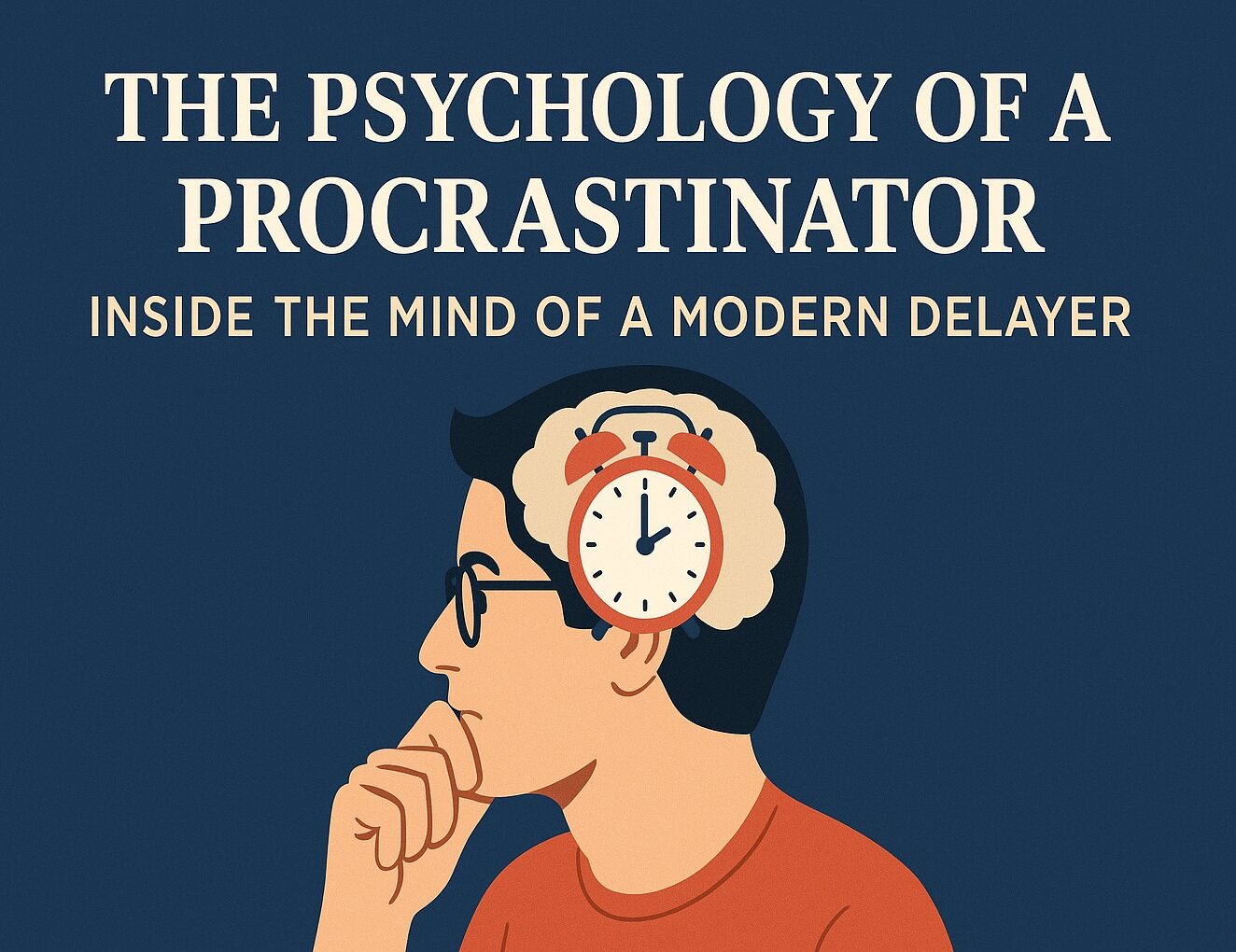
The Psychology of a Procrastinar: Inside the Mind of a Modern Delayer
Procrastinar isn’t lazy; they’re just at war with time, self-doubt, and perfection.
Introduction:
Procrastination of one sort or another comes to all of us. However, to the procrastinar – the one who makes procrastination a serious default mode – this delay is much more than avoidance. Psychology tells us that it is not a personality defect, it is dysfunctional way of coping with bad and good experiences and this is based on emotions, thought and self-identity.
Although procrastination tends to be the term that is poorly regarded by the society as being beget of laziness or sloppiness, a study has revealed that procrastination is actually more of emotion than time. It is a kind of a self defence and the individual will not do something because it is difficult, but rather because it threats their self image, capability or identity.
According to Dr. Timothy Pychyl, an authority on procrastination, he records:
Procrastination is an emotion regulation problem, not a time management problem.
This blog article unravels the psychological engine of procrastination – how it occurs, how it reforms our thinking and how we can overcome it. It would be useful for student who can never get going on an assignment, or the creative who constantly gets into the endless idea-state, knowing well the procrastinar is the beginning of fixing the problem.
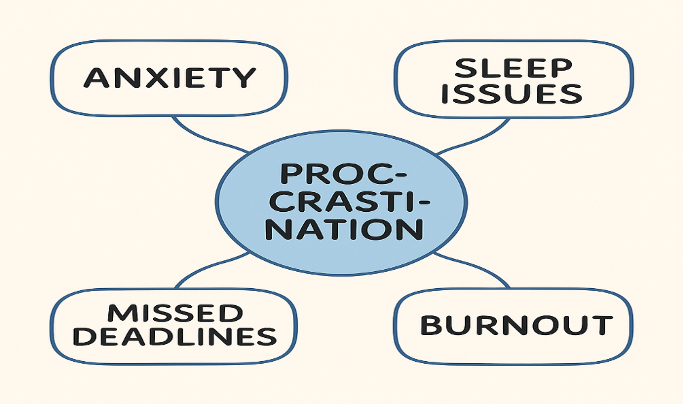
Who is the Procrastinar?
A procrastinar is not merely a delaying person. Psychologically, they:
• Be aware of the task 2
• Experience stress or feel guilty of not doing it
• Nevertheless, decide to do something different (one tends to go with short-term satisfaction or amusement)
This dilemma is one of the focuses of procrastination studies: knowing and action are independent of each other. Psychology aims at clarifying that estrangement.
What is it that makes a Procrastinar Procrastinate?
The formation of procrastination is associated with emotional, cognitive, and neurobiological reasons that are combined. The most researched psychological causes are listed below:
Emotional Avoidance
Some procrastinars do not avoid tasks; rather the feeling that task brings out, which is anxiety, failure, overwhelm, and boredom. Example: A learner puts off a paper, not because he or she does not take it seriously, but because this person becomes frozen with the fear of writing a bad paper.
Temporal Discounting
The remote the reward or consequence is, the less motivated we are. This is a cognitive bias that makes procrastinars select Netflix instead of commencing a project that is due in a week.
Low Self-Efficacy
Without feeling that he or she is able to achieve something, an individual tends to postpone actions in order not to hurt his/her self-esteem. When I do not make any effort, then I cannot fail.
Perfectionism
Ironically, the major procrastinated ones are perfectionists. In case they cannot do it perfectly, they will have no start.
Psychological explanations for this Behaviour:
These are the major theories which rationalize the behaviour of the procrastinar:
Theory Main point
| Self-Regulation Theory | Procrastinators have difficulty to sustain the work in the domain of their emotions and behaviour. |
| Temporal Motivation theory | The tasks are appraised as per value, expectancy, delayed, and impulse |
| Ego Depletion Theory | Willpower can and does get depleted thereby leading to procrastination |
| Cognitive Dissonance | At this point, an incongruence between intention and action is avoided in a discomfort manner |

Psychological Origins of a Procrastinar:
Psychologists explain that the nature of procrastination does not lie in time management, but within the manipulation of emotions. A procrastinator generally:
• Feels self-doubt and judges her execution continuously
• Attention problems when it comes to initiation and task planning of the executive function
• Is frequently obsessed with perfection or fear of failure
• Adopts avoidance as a stress-coping strategy towards anxiety and depressed mood
Among the brain units that are important in this process are the prefrontal cortex (planning, impulse control) and the amygdala (fear, threat detection). When stress reaches an extreme, the brain switches over to short-term comfort instead of long-term objectives.
Types of Procrastinar:
All procrastinators are not alike. Although all types of behaviours might appear alike, they are very different in terms of psychology, i.e., delay, distraction, and missed deadlines. By knowing the type of procrastinar, we will be able to determine why the procrastinator hesitates in taking action and how to assist them, besides motivating them.
The Perfectionist Procrastinarian:
- Central Characteristic: The fear of doing it wrong. Mindset: Either it must be perfect, or it is a failure.
- Psychological roots: Pressing standards + worry of criticism.
- Normal mannerism: It’s overplanning, does non-stop research, and never completes.
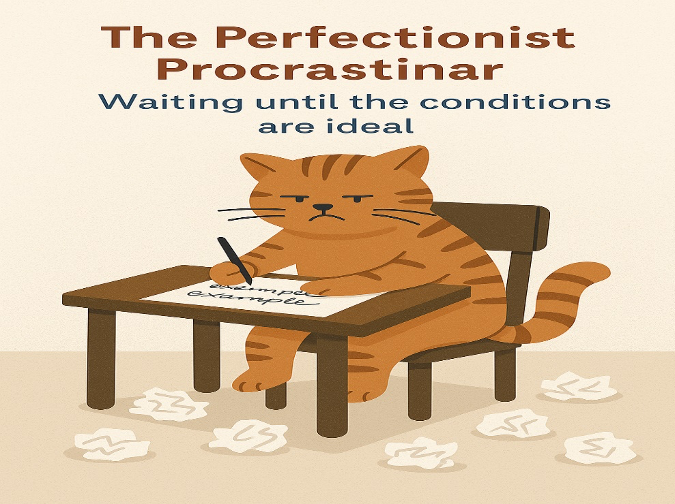
The Overwhelmed Procrastinar:
- Core Trait: Task is too big to start on.
- Mindset: What do you mean? And where do I start? Anxiety + cognitive overload.
- Typical Behaviour: Can not initiate, freezes often, gets distracted by smaller tasks.
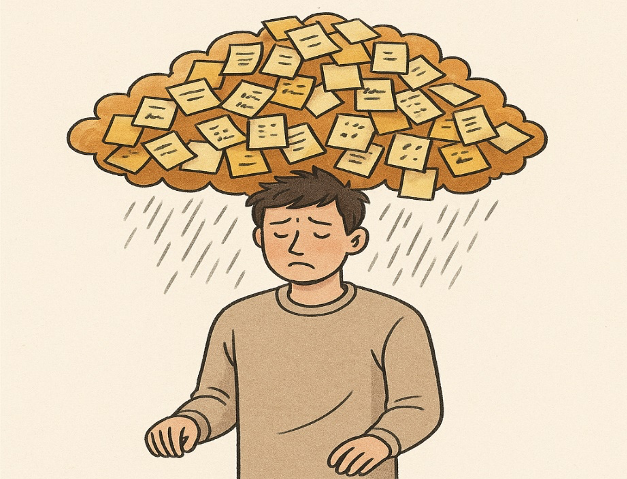
The Procrastinar Thrill-Seeker:
- Core Trait: Goal-oriented and adrenaline addict.
- Mindset: I perform the best when I am under pressure.
- Psychological Origin: Craving of the reward system frequency.
- Normal Behaviour: Works with the last minute, rushes in last minute and crashes through.
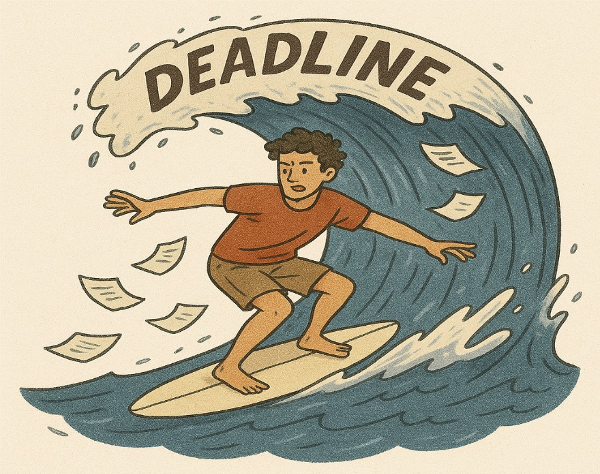
Avoidant Procrastinar:
- Core trait: avoids intimidating tasks.
- Attitude: It can be the more I think that I will fail, the more I will fail, the greater the likelihood that I will not fail.
- Psychological Root: Low self-esteem + dread of failure or critical opinion.
- Typical Behaviour: Shifts blame, does not welcome feedback, and is a ghost at projects.
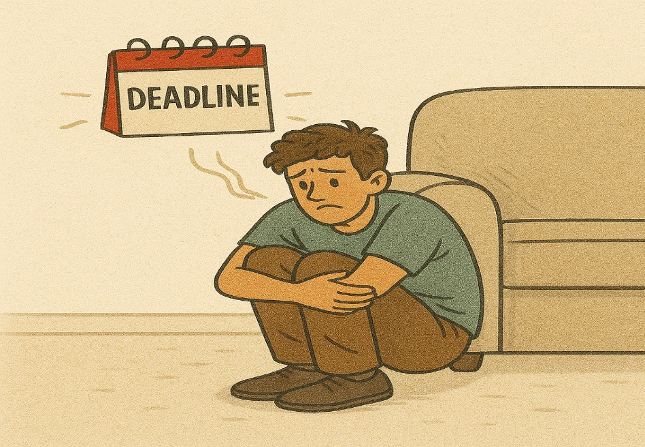
The Procrastinar a Mortal Dempata
- Characteristic Trait: Paralysis by analysis.
- Mindset: What would happen in case I do something wrong?
- Psychological Origin: The fear of regret or engaging in making unchangeable decisions.
- Typical Behaviour: Second-guessing all the time, hesitates making a choice, and is in a stalemate.

The Effects of Prolonged Procrastination
Although procrastination does occur periodically, personality traits of procrastination may have severe consequences at the personal, academic, and psychological levels. It is not only the missed deadline, but a self-trust distracted, the emotional baggage that you carry with yourself always, and a long-term cycle that is difficult to get out of.
Emotional Toll
• Guilt and shame: The procrastinar tends to feel guilty once he/she evades an assignment.
• Anxiety Spiral: The more one waits before working on something, the more cumbersome it becomes.
• Loss of Self-Worth: Failure generates a self-belief that of being incapable to do so.
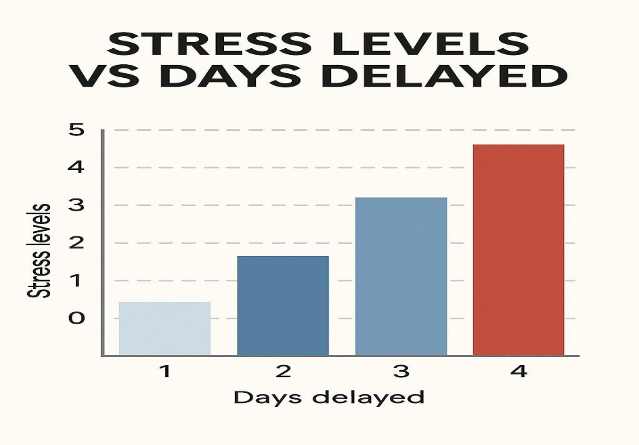
Scholarly and Vocation
• Last-Minute Quality– Last-minute work is hardly the finest.
• Burnout: A sense of immediacy and informality may be tiring.
• Stagnant Growth: Things could not be done earlier, hence the chance might be missed.
Mental Health Aftereffects:
• Associations with Depression & Anxiety: Evidence indicates that chronic procrastination is associated with greater symptoms.
• Sleep Disruption: The disturbance of sleep due to worry and cramming lowers the quality of sleep further deteriorating focus.
• Social Withdrawal: A person can stop spending time with peers, eruditely, or colleagues because of feeling excessive guilt.
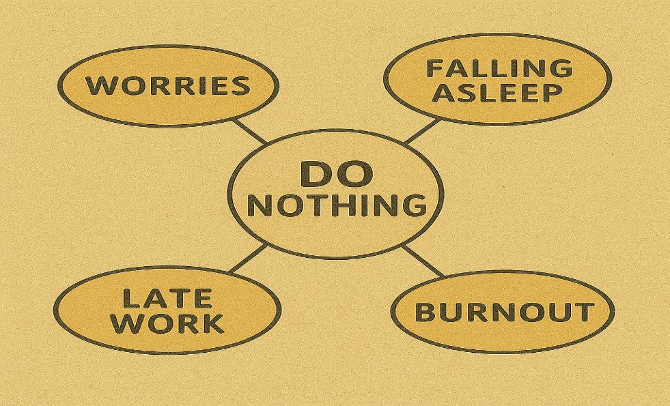
How to Beat Procrastinar Habit
Leaving the cycle of procrastination does not mean becoming a productivity robot; it is actually about figuring out what you are avoiding and selecting tools that recondition your emotional and mental reaction to duties. Some evidence-based general approaches to tackling this based on procrastinate mindset of the procrastinator’s mindset are as follows:
1. The 5-Minute Start Rule: In case a task is too much, promise yourself 5 minutes. When you start moving, the momentum helps to move on. The explanation of why: It overcomes the connection with inertia and lessens mental rejection.
2. Task Reframing Reorganize: how you title things to do. Use this instead of: ‘I have to write this horrid report;’ “I will make headway on something worthy of doing.”
It will work when you: turn a threat into an opportunity. Decreases avoidance of emotions.
3. Never Set Task Goals: Rather than telling yourself to complete the paper, tell yourself to work on it between 25 and 30 minutes. Stay focused with the help of a Pomodoro timer.
How it works: Reduces stress and enhances concentration within a sizeable increment.
4. Make up If-Then Plans: Design action triggers: When it’s 9 AM, I will open my research doc. Why it works: the anchors the behaviour to behaviours that can be anticipated, constructing habit loops.
5. Forgiveness as opposed to Criticism Neglect the voice that assumes a particular attitude, such as: I always mess this up. Instead, do better and say: It is all right not to succeed: I am learning. How to use it: Studies indicate that self-compassion is effective in making one more driven and less stressed.
6. Divide 1 Big Goal into Many
Divide massive tasks into super quick, tiny baby steps, such as doing 1-minute brainstorming or Googling. Small changes are attainable and make starting without worrying. It works because being big-headed paralyses you — being small-headed gets you going!
7. Practise Controlled Distractions Block social media, disable needless notifications, and be nice when offending. Why it works: It does not employ the guilt trap that spawns more procrastination.
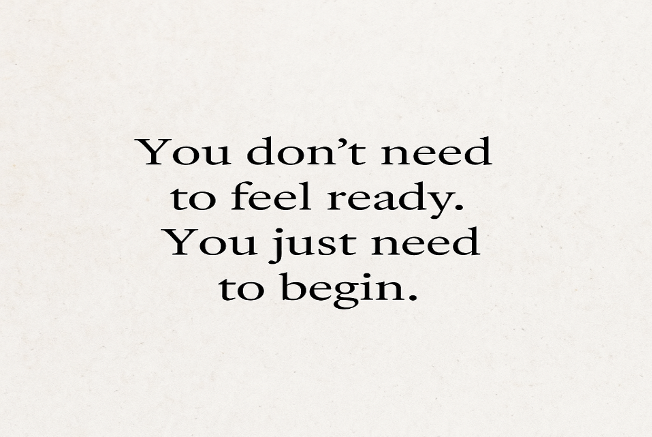
Anti-Procrastinar daily checklist
- Begin with 5 minutes in the beginning
- Run a timer (Pomodoro: 25 minutes work / 5 minutes break)
- Re- phrasing task language (do not say you need to do something)
- Dividing it into micro-steps
- Find out the reason you do not want to do it (fear? bored? overwhelmed?). Adopt the plan of If-Then
- Be kind to self when you trip up
- Become excited over lightly achieved success
References:
- Steel, P. (2007). The Nature of Procrastination. Psychological Bulletin, 133(1), 65–94.
- Sirois, F. M., Melia-Gordon, M. L., & Pychyl, T. A. (2013). “I’ll look after my health, later”: An investigation of procrastination and health. Personality and Individual Differences, 55(6), 699‗03.
- Tuckman, B. W. (1991). The Development and Concurrent Validity of the Procrastination Scale. Educational and Psychological Measurement, 51(2), 473–80.
- Pychyl, T. A., & Flett, G. L. (2012). Procrastination and Self-Regulatory Failure: An Introduction to the Special Issue. Journal of Rational-Emotive & Cognitive-Behavior Therapy, 30, 203–202.
